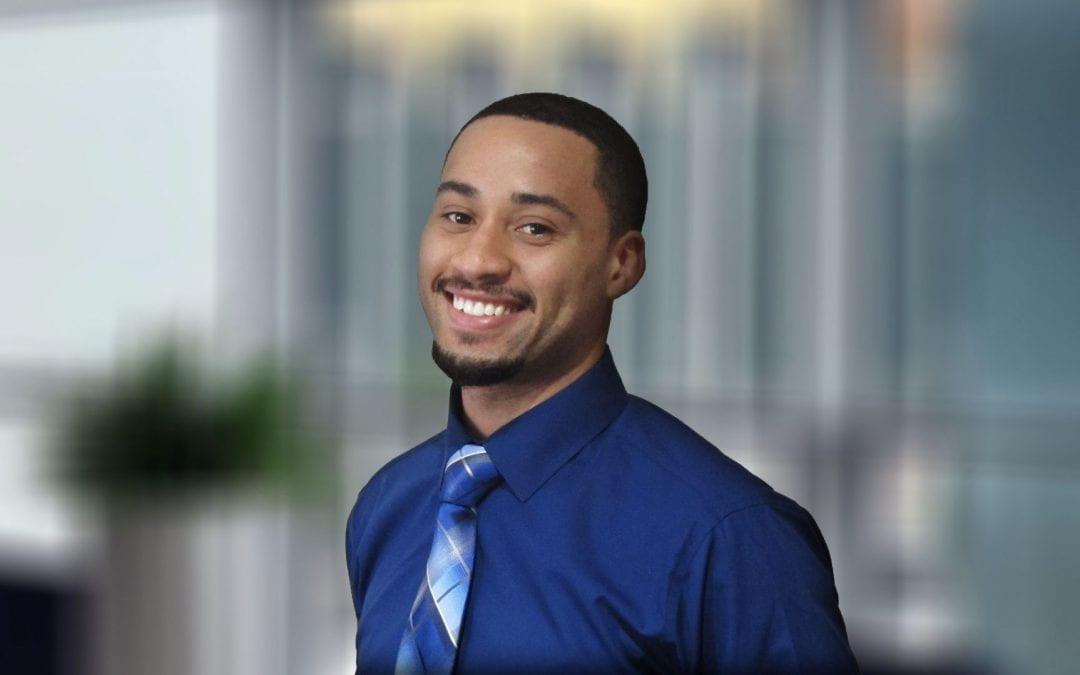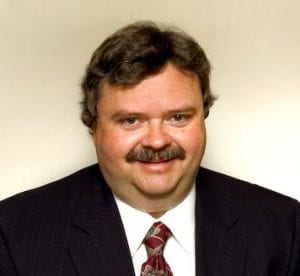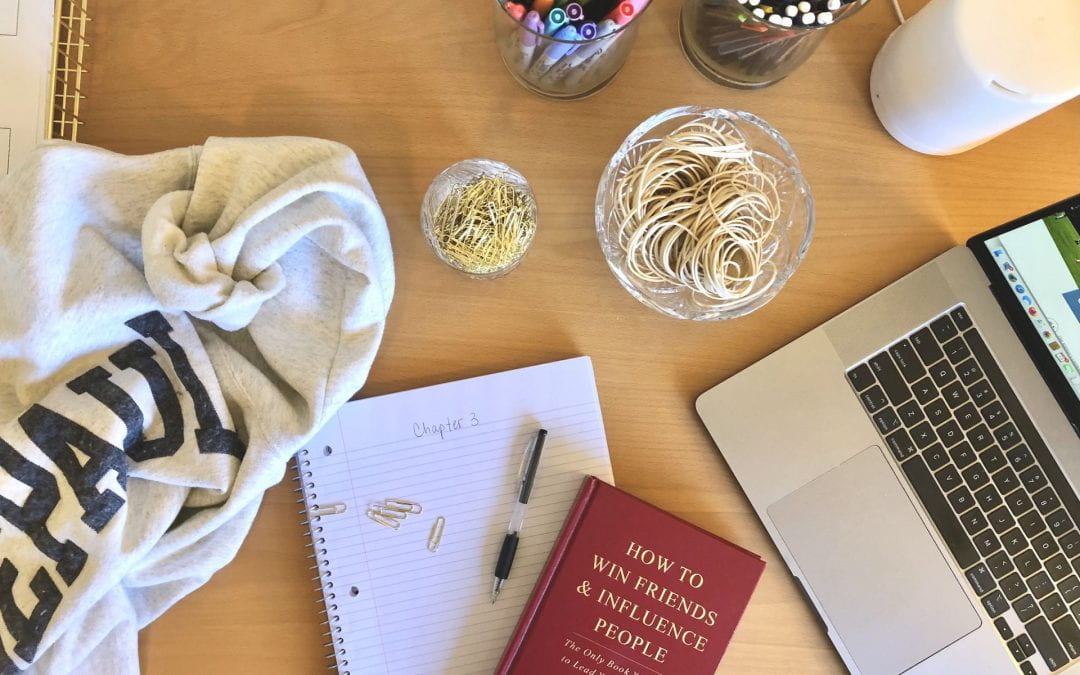
By Adam Krynski and Molly Ryanmiller
Throughout January 2021 we competed against nine other teams in a marketing case competition hosted by Barilla, the world’s largest pasta producer, and the Kellstadt Marketing Group, a student organization at the Kellstadt Graduate School of Business. It was the perfect experiential learning opportunity we were looking for as MBA students: the chance to directly apply class concepts, work in teams with other students, and present a solution and receive feedback from Barilla representatives and Kellstadt faculty who served as judges.
Our mighty team of two, Pasta La Vista, came to the competition with diverse backgrounds and little marketing experience. We wanted to tackle a project outside of the classroom with the goals of learning new skill sets, meeting some new friends and gaining additional professional experiences. In the end, we ended up doing that and more—we took home the winning prize!
Below are six key takeaways from our experience. We hope these tips help set you up for success so you too can walk away with a win at your next case competition.
- Try something new and outside of your comfort zone
Case competitions are a great way to explore learning opportunities beyond the classroom, and this was an important goal of ours coming into graduate school. We were interested in pursuing a case competition that allowed us to develop a strategy for an industry that we were both unfamiliar with, so we ended up walking away with new skills as well as a stronger network within Kellstadt.
- Manage your time effectively
As most graduate students would agree, time management is a crucial key to success. When participating in a case competition, you need to set aside time outside of work, school and your personal life to be fair to your other teammates and deliver a product you’re proud of. We utilized a group chat for frequent communication and Zoom for solutioning. These regular touchpoints before deliverables were due worked very well for holding ourselves accountable.
- Don’t shy away from communicating with the company
Communicate with your team but also with the company whose business challenge you’re trying to solve. As with any life challenge you may be facing, there are some unknowns. In this case, Barilla provided us with certain facts and left out others. In case competitions, it’s an unspoken rule that the company expects teams to not only do their own research outside of what’s provided, but also circle back with them for clarifications. Ask questions, share ideas and ask more questions.
- Help the judges visualize your solution
Attention to detail is key when preparing how you will deliver your solution. In our executive summary, we approached the deliverable with a “less is more” attitude. While we made sure to answer all questions from our kickoff meeting and challenge guidelines, we didn’t provide too much detail or solutioning. In our presentation, however, we went a step further by providing additional research, actionable insight and visuals such as graphs and tables, so the judges could truly envision what our idea would look like throughout the entire lifecycle of our recommended strategy.
- Use a confident and natural presentation style
Be professional but also be yourself. If you’re too rehearsed, you’ll come across as if you’re reading directly from your notes. If not rehearsed enough, you’ll come across as unprepared. While you want to make sure you’ve outlined your speaking notes ahead of time, leave some room to be conversational.
- Have fun!
At the end of the day, this experience is meant to be fun. Get to know your teammates on a personal level and you’ll not only walk away with a great experience, but with some new friends too.
 Adam Krynski is pursuing his MBA with a concentration in strategy, execution and valuation at the Kellstadt Graduate School of Business while working full-time in corporate finance. He likes to take road trips and take his dogs to the Lake Michigan beach on sunny days. He is excited to cook a new meal with his new pasta prize pack.
Adam Krynski is pursuing his MBA with a concentration in strategy, execution and valuation at the Kellstadt Graduate School of Business while working full-time in corporate finance. He likes to take road trips and take his dogs to the Lake Michigan beach on sunny days. He is excited to cook a new meal with his new pasta prize pack.
 Molly Ryanmiller is an MBA candidate at the Kellstadt Graduate School of Business and president of the DePaul Consulting Club. She graduated from Indiana University, Bloomington in 2014 with a BS in informatics, a concentration in public health and a minor in communication and culture. She currently works as a global data and analytics consultant at Deloitte. In her free time, you can find her facilitating mindfulness and meditation classes at Deloitte, riding in a spin class, learning about interior design and out on adventures with her dog Zoey.
Molly Ryanmiller is an MBA candidate at the Kellstadt Graduate School of Business and president of the DePaul Consulting Club. She graduated from Indiana University, Bloomington in 2014 with a BS in informatics, a concentration in public health and a minor in communication and culture. She currently works as a global data and analytics consultant at Deloitte. In her free time, you can find her facilitating mindfulness and meditation classes at Deloitte, riding in a spin class, learning about interior design and out on adventures with her dog Zoey.

By Jimmy Dooley
I decided to go to graduate school amidst a global pandemic, largely because of the low interest rates for student loans. I studied advertising and marketing at Southern Illinois University, Carbondale and felt I had the entrepreneurial spirit but lacked the resources or ideas necessary to start my own business. When I was accepted into the Kellstadt Graduate School of Business, I thought the Master of Science in Entrepreneurship program would round out some of my weaknesses.
This program feels less like a series of classes, and more like a combination of lessons
The classes I have taken at Kellstadt are all connected. I often find myself referencing concepts from one class in an assignment for another. In my undergraduate program I questioned the relevance of my curriculum, but the Master’s in Entrepreneurship program is simple; it gives students exactly what they need to be an entrepreneur.
During my second quarter I signed up for the “Social Enterprise” class, hoping to learn more about how to create a sustainable business of my own. The course revolves around a team consulting project for a few different mission-driven ventures in Chicago. A “mission-driven venture” or “social enterprise” are terms for businesses that are driven not solely by profit but by the greater purpose of helping others.
My group and I were assigned HHPLIFT, an online nonprofit marketplace for artisan crafted goods. HHPLIFT creates business for social enterprises with workforce development programs that support and expand job opportunities for people with significant barriers to fair wage employment.
We were charged with creating a marketing strategy for a new product line, launching this spring, crafted by refugee women in a fair-trade work environment.
Halfway through this team project I recognized a big problem in the social enterprise space: the marketing was sloppy. Branding was all over the place, and most companies fail to deliver the story customers want. After analyzing numerous competitors, I recognized a clear need for an advertising agency devoted to the social enterprise industry.
I recognized the problem; how do I create the solution?
My idea was simple. Why not create my own advertising agency solely focused on social enterprises and sustainable businesses? I just needed help creating the solution.
So, I signed up for 1871, Chicago’s digital start-up community.
When I first started my degree, I was really lost on how to get more involved at Kellstadt. I figured there wasn’t much point in joining a club if I was only going to be there for a year, much less join an organization that can’t even meet in person. But despite school being online, I found I had everything I needed to turn an idea into a business.
1871 is a one-stop-shop for entrepreneurs and a fantastic resource for DePaul students. They take your idea at any stage of the business-planning process and get you the help you need. Whether you’re creating a new social network or re-inventing the wheel, 1871 has the answer to your questions.
Meanwhile, towards the end of the social enterprise class, we learned about the different types of funding models for mission-driven businesses. One funding model that stuck out to me was the hybrid model, where a company is for-profit and socially responsible. I decided this was the direction I wanted to take for my own social enterprise venture.
Time doesn’t stop, even during a global pandemic
Time has not slowed down since the pandemic started. Businesses have had to adapt to the new environment or close, and I have a fraction of the social life I once had— but now I have the time to pursue my passion. A lot of my distractions have vanished, and I’ve had to make an easy but critical decision. Do I kill the time the pandemic has given to me, or do I take advantage of it?
Without the help of my professors at DePaul and the staff at 1871 I wouldn’t have the confidence I have now to pursue my idea. I’m slowly working on putting thoughts into action and plan on committing myself full-time to my venture once I graduate in June.
If there is one thing the MS in Entrepreneurship program at Kellstadt has taught me it’s how to identify a problem and create the solution. Today, I’m no longer the confused advertising student from last September. I can be the next entrepreneur, and I have the resources available to me—even in this virtual space—to bring my ideas to life.
A revised curriculum for the MS in Entrepreneurship Program at the Kellstadt Graduate School of Business is debuting completely online in fall 2021. Learn more on the program website.
 Jimmy Dooley graduated from Southern Illinois University, Carbondale with a bachelor’s degree in journalism. He spent most of his undergraduate degree underwater as a four-year member of the Saluki men’s swim team and attributes most of his work ethic to his athletic career. With the help of 1871, Jimmy is currently pursuing his passion of starting an advertising agency for sustainable businesses.
Jimmy Dooley graduated from Southern Illinois University, Carbondale with a bachelor’s degree in journalism. He spent most of his undergraduate degree underwater as a four-year member of the Saluki men’s swim team and attributes most of his work ethic to his athletic career. With the help of 1871, Jimmy is currently pursuing his passion of starting an advertising agency for sustainable businesses.

By Katie Wuchter
You may recognize me from your initial interaction with the Kellstadt Graduate School of Business; however, some of you now know me as your classmate. I have been a part of the Kellstadt recruitment team for more than three years now. Having already earned my master’s in counseling, I decided to partake in a new journey to expand my knowledge in recruitment by completing a master’s degree in human resources at Kellstadt. Like my fellow classmates, I’m eager to continue learning and to avoid becoming stagnant in a career.
Choosing Kellstadt
One of the hardest things about starting a new graduate program is ensuring that it is the right next step as well as fit for you. Luckily, as someone who works at DePaul’s business college, I was in a position where I was able to get first-hand knowledge of the student experience and make personal connections with the faculty prior to even starting the program.
Because of this, I feel that I’m able to be fully authentic in my career for the first time in my life. Now from a Kellstadt student perspective, I can personally guarantee that what my team has been preaching to their students is completely accurate.
I am experiencing all the devotion from our faculty members that I’ve spoken to prospective students about as a staff member, and I’m personally benefitting from the commitment that our Kellstadt Career Management Center team provides to students.
Each week, for example, my academic advisor lays out all of the upcoming events, deadlines and notifications to make sure I am on track with my program. This high level of communication leads to our incredible student success. With all of our departments being so hands-on and focused on customer service with our students, it’s no wonder we had the highest fall 2020 enrollment in graduate business school since 2010! Our reputation proceeds us and the word is out.
Diving Back into the Classroom
My first class with Clinical Professor Stephanie Dohrn, called Human Capital Strategy & Science, reignited my passion and solidified my decision to return to higher education to pursue the Master of Science in Human Resources degree. Taking that first class truly increased my excitement to do more within my staff role and to strengthen my connections throughout other departments at DePaul.
Throughout the online course, Clinical Professor Dohrn displayed her passion and knowledge for the content fluidly. I caught myself smiling and enjoying what I was learning throughout the entire class as she challenged us to think outside the box and put our personal perspectives and experiences into play.
I only just started my second course at Kellstadt with Senior Instructor Sharon Glennon and she has already declared her passion for ensuring students have a positive experience and a smooth, enjoyable transition, from the moment we add her class to our schedule. This is what you get here at DePaul. Faculty who care about YOU.
Coming Full Circle
During my next Kellstadt Graduate School of Business information session, which I lead as part of my role, I can proudly explain how we are different from other universities. We are a family, whether you are just beginning or have graduated many years ago. Making the decision to go here can truly elevate you to higher levels in more realms of your life than you can possibly imagine. It’s about the experience as much as the content. The people here strengthen you and I cannot wait to see what else is in store for my career because I plan to grow here for a very long time.
If I could leave you with one piece of advice, I would tell you to make connections as often as you can. You never know how that person – student, faculty or staff member – can affect your career. Graduate school is all about what you make of it.
If your goal is to earn your degree as quickly as possible while keeping your head down, then to each their own. But if you’re like me and want to grow and learn from the people around you, then start by sending a simple email or hello on LinkedIn and watch your network expand! You may not need their help at the moment, but it never hurts to know you have an additional resource for future reference.
Lastly, utilize the Kellstadt Career Management Center and develop relationships with the people there who have their foot in the industry you’re interested in. I have preached about their talents and passions to all of my students and every bit of it is true. They want to see you succeed, and I do too. Best of luck, and I hope you enjoy the journey.
Katie Wuchter is an assistant director of recruitment for the Kellstadt Graduate School of Business. She graduated from Eastern Illinois University with her bachelor’s in sociology and business administration and earned a master’s in counseling from Lewis University. She is currently pursuing a master’s in human resources management at Kellstadt to expand her knowledge in recruitment and selection. She hopes to expand her network within the DePaul chapter of the Society for Human Resource Management.

DePaul MBA Student Andrew Winburn says Kellstadt’s revised MBA curriculum helped him refocus his degree concentration and reduce his out-of-pocket tuition cost.
By Jaclyn Lansbery
In April 2020, the Kellstadt Graduate School of Business announced the new DePaul MBA. The school revised the curriculum to focus more on data analytics and business innovation and shortened the completion time to 18 months for most students. Lastly, the DePaul MBA is now test-optional, so that students do not have to submit GMAT or GRE scores to be accepted into the program.
Below, we talked with two students who were able to take advantage of the program’s new benefits while earning their MBA at Kellstadt.
Reducing Cost, Adding Value
Evening MBA student Andrew Winburn entered Kellstadt with a background in mechanical engineering. After graduating with his bachelor’s degree from Bradley University, Winburn worked in a variety of engineering roles: applications, design and now sales engineering. His current role led him to seek out an MBA program that would help him refine his business acumen and move into more senior roles.
Winburn is currently pursuing a DePaul MBA in Business Analytics. “The redesigned MBA at Kellstadt emphasizes design and innovation further in its core curriculum and shifts the focus toward one concentration instead of two,” he says. “I liked this change and felt that I didn’t need two concentrations, so I jumped at the opportunity to reduce my overall out-of-pocket tuition cost and focus on one specialty. I find it refreshing that DePaul was open to reevaluating their curriculum based on feedback they received.”
Staying Ahead of the Knowledge Curve
Thanks to the shorter completion time, full-time MBA student Carl Kettler will graduate from the program two quarters earlier than he had planned. A father of two grown children, one of whom is close to finishing her MBA, Kettler was eager to begin working full-time again. “My ability to step away from working in order to be a full-time student, combined with the change in the program, has allowed me to earn my MBA from a well-respected program very quickly,” he says.
Prior to graduate school, Kettler spent years working in business technology and even considered earning a doctorate degree after graduating with his bachelor’s degree in accounting from the University of Buffalo in New York. Following the dot-com bubble in the mid-1990s, Kettler craved a new path as well as more autonomy. He ended up buying into and managing an Illinois-based franchise for the next 10 years of his career.

Carl Kettler
As a life-long learner, he always knew he wanted to go back to school so he could one day teach and improve his business knowledge. Thanks to his background and accounting degree, Kettler was able to waive several of his classes and had already taken the GMAT years before enrolling in Kellstadt.
“I was very appreciative of the interview process because it gave me a chance to meet some of the people who are going to be there to support me from the administrative side of the program,” he says, adding that the DePaul Career Management Center’s support “felt like DePaul has wanted to help me find a job before attending my first day of class.”
Once he graduates this month, Kettler plans to launch his technology consulting business and possibly begin teaching as an adjunct faculty member at a nearby college.
“Evidence-based management has really been beaten into me within the last year and a quarter,” he adds. “I really do feel like I have a new set of tools to go out and use to be able to back up why things work, why they don’t work, and how things could be done better. I think that combined with all of the experience that I have, everything I’ve learned at Kellstadt is going to make me more valuable to whatever I do next.”
Learn more about the new DePaul MBA
Jaclyn Lansbery is a website and social media content editor at the Driehaus College of Business.

Before you say anything, I know — this whole “virtual learning” thing is not the most ideal situation and it is not the way many of us wish we would be spending our college experience. We can’t ignore the emotions we are all facing, but we also can’t change the circumstances (besides wearing a mask, of course). What we can do is trust the phenomenal faculty and staff we have here at DePaul University and the Kellstadt Graduate School of Business. Our professors and advisors are working diligently to provide us a sense of security, understanding and support, which I know the current student body is incredibly grateful for.
This time we are going through will bring immense levels of challenge that go beyond our course content, so it is important that each student is doing what they can to better prepare themselves. Below is a checklist that has helped me optimize my productivity while taking virtual classes. We might as well make the most of it!
1. Find your own space
Finding your own study space is a valuable tactic while completing lectures, class Zoom meetings, appointments and homework. There is much to be said about making an at-home space as similar to a classroom setting as much as possible. Everyone’s space circumstances differ, so whether it is an entirely different room or a small desk in your bedroom, having a designated destination for school work will get your mind and body ready for anything the school day brings.
Personally, I have transformed a spare room in my house into a little home office. I made this experience an opportunity to have some fun by redecorating this room into a comfortable school work sanctuary. This space prepares my mind for my responsibilities each day.
2. Communicate with professors
This, by far, is one of the most powerful tools I have implemented in my quarterly routine. Since we can’t meet face-to-face, it’s important to me that I grow and develop connections with my professors. Prior or within the first week of classes, I take time to reach out to each professor I have that quarter. I send them a professional email introducing myself and asking if they would be available to connect via Zoom (Zoom is a personal preference; others might continue to communicate in an email thread).
Opening the line of communication, breaking the ice and having a conversation with your professors will not only benefit you throughout the quarter with your studies, but it’s a great networking tactic as well. It is quite inspiring to feel the support and care of the Kellstadt faculty. This is where your network grows, so water these professional relationships and opportunity will bloom! I promise you — your professors will recognize the effort and admire your dedication, helping you make the most of your grad school experience.
3. Connect with classmates
I am currently enrolled in the Full-Time MBA program and there is not a single day that I don’t recognize and express gratitude for my classmates. Graduate school is a unique and challenging time in all our lives and it’s an honor to be learning alongside such extraordinary and intelligent students. DePaul introduces us to one another, allowing us to form lifelong friendships.
The relationships you make at Kellstadt will be of great value to your learning experience. Being virtual has directed us toward great technological tools, making it easy and accessible to communicate in small or large groups about projects, course content, student organizations and virtual events. My classmates and I also use Slack and GroupMe to communicate. If you are not yet familiar with these tools, no need to worry. Download them and you’ll learn them in no time.
4. Stay organized
Organization will be your lifestyle hack while taking classes virtually. Whether it’s a notebook planner, your mobile phone calendar, Post-it Notes, etc., planning your responsibilities on different timelines will help you prioritize and practice successful time management. Bring out the highlighters, Sharpies and more. This is another great opportunity to get creative and have fun with planning.
5. Ask for help
People are sometimes mistaken when attending graduate school. Yes, it comes with rigorous courses and new challenges, but you are most definitely not alone in the process. Kellstadt has phenomenal faculty and staff, so there is always someone available to help you reach your goals by assisting you toward your utmost potential. Just because you’re in graduate school now, it does not mean you can’t ask for help. We are always learning something new.
In addition, don’t be afraid to provide feedback to your professors. Though Kellstadt has always offered online courses, virtual learning is new to some professors and staff, as well. Take advantage of these conversations and provide feedback on how your courses are going or where you feel students could use more support.
6. Take breaks
…Because even graduate students need to manage their personal lives. These breaks will help your mind decompress, relax and ultimately, obtain more information in the long run. Make it a priority to plan 15- to 30-minute breaks into your daily schedule.

Marisa Farella is a current MBA Candidate and Graduate Assistant at Kellstadt Graduate School of Business. She graduated from DePaul University in 2018 with her Bachelor of Arts degree in public relations and advertising, making her a proud soon-to-be Double Demon. In addition to her studies, Marisa has taken her love for writing and creativity a step further. She is the self-published author of her debut collection, “Truth or Dare: Poetry,” which is available on Amazon.

 Adam Krynski is pursuing his MBA with a concentration in strategy, execution and valuation at the Kellstadt Graduate School of Business while working full-time in corporate finance. He likes to take road trips and take his dogs to the Lake Michigan beach on sunny days. He is excited to cook a new meal with his new pasta prize pack.
Adam Krynski is pursuing his MBA with a concentration in strategy, execution and valuation at the Kellstadt Graduate School of Business while working full-time in corporate finance. He likes to take road trips and take his dogs to the Lake Michigan beach on sunny days. He is excited to cook a new meal with his new pasta prize pack. Molly Ryanmiller is an MBA candidate at the Kellstadt Graduate School of Business and president of the DePaul Consulting Club. She graduated from Indiana University, Bloomington in 2014 with a BS in informatics, a concentration in public health and a minor in communication and culture. She currently works as a global data and analytics consultant at Deloitte. In her free time, you can find her facilitating mindfulness and meditation classes at Deloitte, riding in a spin class, learning about interior design and out on adventures with her dog Zoey.
Molly Ryanmiller is an MBA candidate at the Kellstadt Graduate School of Business and president of the DePaul Consulting Club. She graduated from Indiana University, Bloomington in 2014 with a BS in informatics, a concentration in public health and a minor in communication and culture. She currently works as a global data and analytics consultant at Deloitte. In her free time, you can find her facilitating mindfulness and meditation classes at Deloitte, riding in a spin class, learning about interior design and out on adventures with her dog Zoey.








Recent Comments